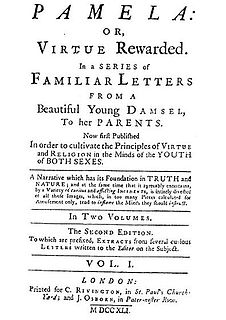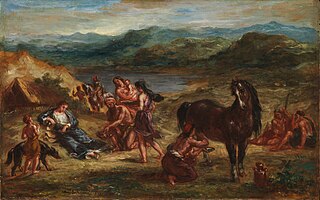Related Research Articles
The elegiac couplet is a poetic form used by Greek lyric poets for a variety of themes usually of smaller scale than the epic. Roman poets, particularly Catullus, Propertius, Tibullus, and Ovid, adopted the same form in Latin many years later. As with the English heroic, each couplet usually makes sense on its own, while forming part of a larger work.

An epistolary novel is a novel written as a series of documents. The usual form is letters, although diary entries, newspaper clippings and other documents are sometimes used. Recently, electronic "documents" such as recordings and radio, blogs, and e-mails have also come into use. The word epistolary is derived from Latin from the Greek word ἐπιστολή epistolē, meaning a letter.

Quintus Horatius Flaccus, known in the English-speaking world as Horace, was the leading Roman lyric poet during the time of Augustus. The rhetorician Quintilian regarded his Odes as just about the only Latin lyrics worth reading: "He can be lofty sometimes, yet he is also full of charm and grace, versatile in his figures, and felicitously daring in his choice of words."

Pūblius Ovidius Nāsō, known in English as Ovid, was a Roman poet who lived during the reign of Augustus. He was a contemporary of the older Virgil and Horace, with whom he is often ranked as one of the three canonical poets of Latin literature. The Imperial scholar Quintilian considered him the last of the Latin love elegists. Although Ovid enjoyed enormous popularity during his lifetime, the emperor Augustus banished him to a remote province on the Black Sea, where he remained until his death. Ovid himself attributes his exile to carmen et error, "a poem and a mistake", but his discretion in discussing the causes has resulted in much speculation among scholars.

In Greek mythology, Canace was a daughter of Aeolus and Enarete, and lover of Poseidon. Her brothers were Athamas, Cretheus, Deioneus, Magnes, Perieres, Salmoneus and Sisyphus. Her sisters were Alcyone, Arne, Calyce, Peisidice, Perimede and Tanagra. With Poseidon, she was the mother of Aloeus, Epopeus, Hopleus, Nireus and Triopas.

An epistle is a writing directed or sent to a person or group of people, usually an elegant and formal didactic letter. The epistle genre of letter-writing was common in ancient Egypt as part of the scribal-school writing curriculum. The letters in the New Testament from Apostles to Christians are usually referred to as epistles. Those traditionally attributed to Paul are known as Pauline epistles and the others as catholic epistles.

Pseudepigrapha are falsely attributed works, texts whose claimed author is not the true author, or a work whose real author attributed it to a figure of the past.

Eloisa to Abelard is a verse epistle by Alexander Pope that was published in 1717 and based on a well-known medieval story. Itself an imitation of a Latin poetic genre, its immediate fame resulted in a large number of English imitations throughout the rest of the century and other poems more loosely based on its themes thereafter. Translations of varying levels of faithfulness appeared across Europe, starting in the 1750s and reaching a peak towards the end of the 18th century and the start of the 19th. These were in the vanguard of the shift away from Classicism and towards the primacy given emotion over reason that heralded Romanticism. Artistic depictions of the poem's themes were often reproduced as prints illustrating the poem; there were also paintings in France of the women readers of the amorous correspondence between the lovers.

The Heroides, or Epistulae Heroidum, is a collection of fifteen epistolary poems composed by Ovid in Latin elegiac couplets and presented as though written by a selection of aggrieved heroines of Greek and Roman mythology in address to their heroic lovers who have in some way mistreated, neglected, or abandoned them. A further set of six poems, widely known as the Double Heroides and numbered 16 to 21 in modern scholarly editions, follows these individual letters and presents three separate exchanges of paired epistles: one each from a heroic lover to his absent beloved and from the heroine in return.
Nationality words link to articles with information on the nation's poetry or literature.
Sabinus was a Latin poet and friend of Ovid. He is known only from two passages of Ovid's works.

The Double Heroides are a set of six epistolary poems allegedly composed by Ovid in Latin elegiac couplets, following the fifteen poems of his Heroides, and numbered 16 to 21 in modern scholarly editions. These six poems present three separate exchanges of paired epistles: one each from a heroic lover from Greek or Roman mythology to his absent beloved, and one from the heroine in return. Ovid's authorship is uncertain.
Epistulae or Epistles are a specific genre of letter-writing composed in Latin. The term may also refer to specific works:

A héroïde is a term in French literature for a letter in verse, written under the name of a hero or famous author, derived from the Heroides by Ovid. It was invented by Charles-Pierre Colardeau. the héroïde is a form of tragedy under the form of epistle as it is not mandatory that the héroïde be written under the name of a famous character, and it is not enough either that the epistle is either to be defined under the term. What the héroïde consists of is more that the nature of the subject needs to be serious, sad and belong to epic poetry and the elegy. The dramatic action is psychological, the story replaces the dialogue and the reader's imagination must be taken sufficiently to make it able to reconstitute the evolution of the drama to which it is only given the view of one of the characters.
Angelo Sabino or in Latin Angelus Sabinus was an Italian Renaissance humanist, poet laureate, classical philologist, Ovidian impersonator, and putative rogue.

Ovid, the Latin poet of the Roman Empire, was banished in 8 AD from Rome to Tomis by decree of the emperor Augustus. The reasons for his banishment are uncertain. Ovid's exile is related by the poet himself, and also in brief references to the event by Pliny the Elder and Statius. At the time, Tomis was a remote town on the edge of the civilised world; it was loosely under the authority of the Kingdom of Thrace, and was superficially Hellenized. According to Ovid, none of its citizens spoke Latin, which as an educated Roman he found trying. Ovid wrote that the cause of his exile was carmen et error: "a poem and an error", probably the Ars Amatoria and a personal indiscretion or mistake. The council of the city of Rome revoked his exile in December 2017, so he would be able to freely return.
Pegasides were nymphs of Greek mythology connected with wells and springs, specifically those that the mythical horse Pegasus created by striking the ground with his hooves.
Charles Hopkins (1664?–1700?) was an Anglo-Irish poet and dramatist.

James Woodhouse (1735–1820) was an English poet from the Black Country village of Rowley Regis. He was known as the "shoe-maker poet" from his trade that supported him during his early years. He made the acquaintance of the poet William Shenstone, who lived nearby, and was encouraged by him to write poetry. In 1764 a collection of his poems was published with the financial assistance of his friends and he acquired some fame as a writer of "humble" beginnings. He acquired literary patrons, the most of important being the "bluestocking" Elizabeth Montagu, who also became his employer. After a dispute with Montagu, he left her service and his final years were spent in London, where he set up a bookselling business. He died in 1820 and was buried at the cemetery of St George's Chapel, near Marble Arch in London.
Persona poetry is poetry that is written from the perspective of a 'persona' that a poet creates, who is the speaker of the poem. Dramatic monologues are a type of persona poem, because "as they must create a character, necessarily create a persona".